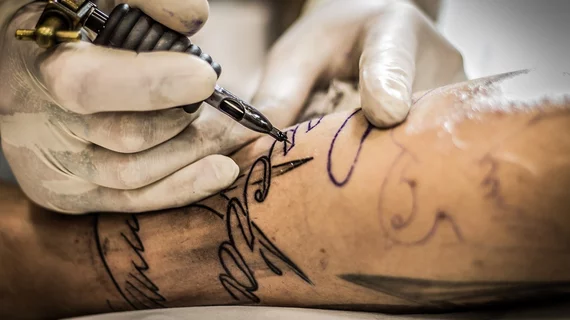Is it safe for people with tattoos to have MRI exams?
Could a patient having one or multiple tattoos be a safety risk when undergoing an MRI exam? Researchers led by Martina F. Callaghan, PhD, from the University College London Wellcome Center for Human Neuroimaging in London, found that tattoo-related adverse reactions from MRI are possible—but come at low risk, according to a correspondence recently published online in the New England Journal of Medicine.
Patients enrolled in neuroimaging studies at the Wellcome Center were recruited for the research. In order to qualify, they had to have at least one tattoo and meet the following criteria: less than five percent of their entire body was tattooed, tattoo or tattoos were less than 20 centimeters in length and no tattoos on the head, neck or genitals.
Characteristics including the number, color and dimensions of the tattoos, as well as what year and what country the tattoos were applied were recorded. The maximum specific absorption rate of the MRI scans (which was kept at less than two watts per kilogram) and the age and sex of the participants were also noted, according to the researchers.
In total, 330 participants between the ages of 18 and 66 years old underwent MRI exams in 585 total sessions. Each participant had between one to seven tattoos, totaling 932 tattoos across the entire cohort.
“Five different MRI scanners (one Allegra scanner, three types of Magnetom Trio scanners, and one Magnetom Prisma scanner, all manufactured by Siemens) had either a body coil (in 567 sessions) or a localized head coil (in 18) for radio-frequency transmission,” the researchers wrote, noting that maximum specific absorption rate of the MRI ranged from 4 to 95 percent with an average rate of 36 percent.
One participant reported having “awareness” of a tattoo and “tingling when scanning began." Another participant who had several tattoos reported a warm and tight felling around one tattoo on the wrist during the exam and was classified as a mild-tattoo related adverse reaction, according to the researchers.
The researchers estimated the probability of an adverse reaction to be 0.17 percent overall, assuming independent observations and 0.30 percent assuming maximal correlation among repeated sessions for individual participants.
“Our findings indicate a low risk of tattoo-related adverse reactions under these specific study conditions,” the researchers concluded.
Editor's Note: The estimated probabilities of an adverse reaction have been corrected from a previous version.

